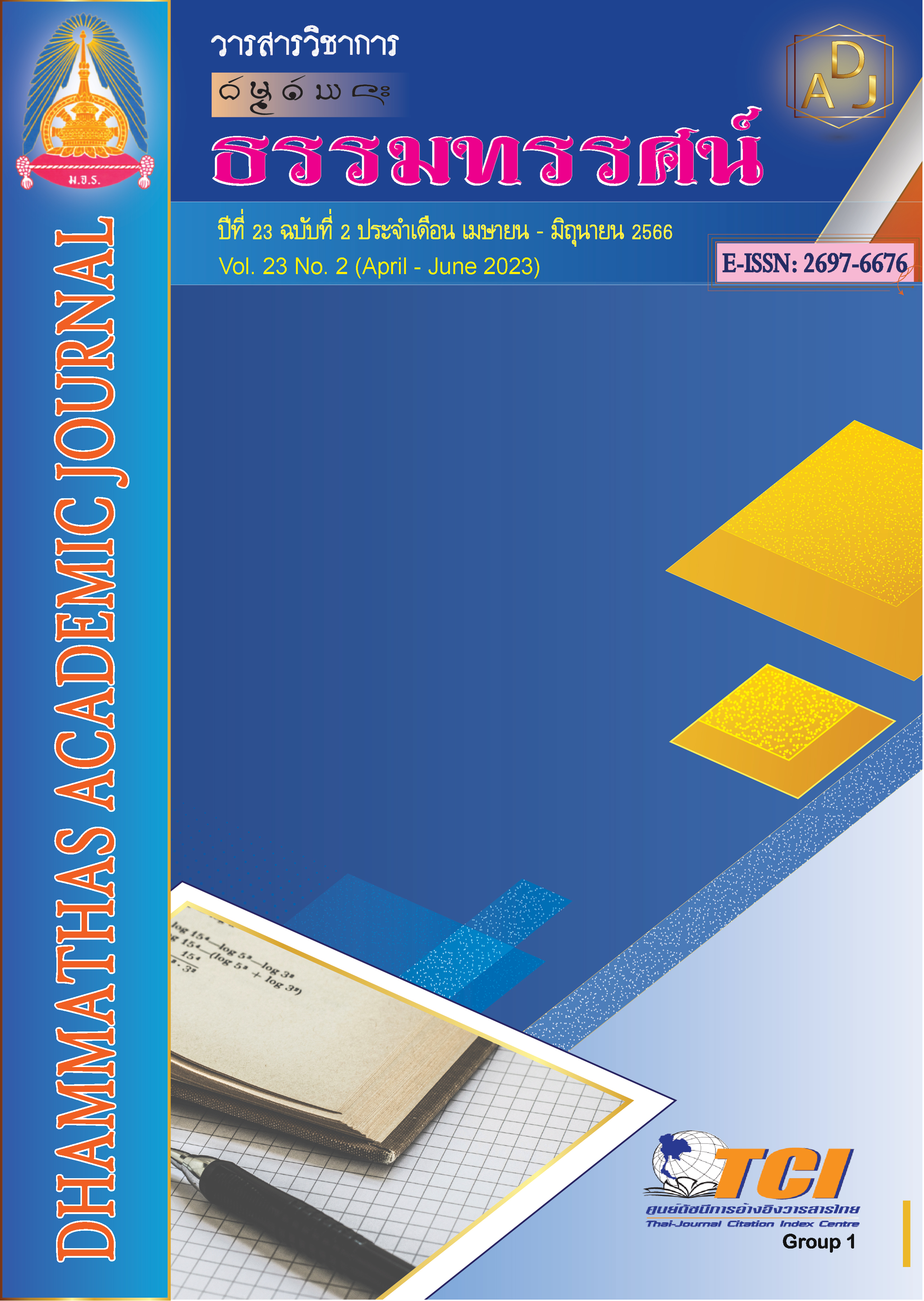Developing Administrative Skills to Create a Relationship Dimension
Main Article Content
Abstract
Good management must practice and develop management skills all the time. which has the process of studying and increasing the body of knowledge in management science and methods of management as an important basis, Self-improvement in Buddhism according to the Pali language is called attattha, self-benefit, and management skills development in the form of Developing management skills to create a relationship dimension is the development for the organization as a whole in Buddhism, called Prattha, benefits for others. But if the knowledge in management science and methods of management are also developed Develop management skills to create a relationship dimension, that is, develop yourself and develop for the organization as well. In Buddhism, it is called upayattha. The two benefits consist of 1) development of political cognitive skills, 2) development of conceptual skills that can analyze complexity, and 3) development of communication skills. The stimulating media is a model and authorization. 4) The development of analytical skills, the diagnostic process, management skills (Diagnosis) 5) The development of the ability to use information communication technology 6) The development of a big picture skill the impact of risk management for social responsibility (CSR Risk Management), both image and overview using a strategy for the future (Scenario Strategy) in this article, a model for developing managerial skills is presented to create a relationship dimension to study the relational dimensions of management skills and as a guideline for developing and integrating management styles in the 21st century, and for the benefit of the executives themselves in developing their management skills Beneficial to the organization by being able to manage the organization under changes to allow the organization to adapt and develop a management style, and benefit society resulting in development according to the goals and operational objectives of that organization.
Article Details

This work is licensed under a Creative Commons Attribution-NonCommercial-NoDerivatives 4.0 International License.
เพื่อให้เป็นไปตามกฎหมายลิขสิทธิ์ ผู้นิพนธ์ทุกท่านต้องลงลายมือชื่อในแบบฟอร์มใบมอบลิขสิทธิ์บทความ ให้แก่วารสารฯ พร้อมกับบทความต้นฉบับที่ได้แก้ไขครั้งสุดท้าย นอกจากนี้ ผู้นิพนธ์ทุกท่านต้องยืนยันว่าบทความ ต้นฉบับที่ส่งมาตีพิมพ์นั้น ได้ส่งมาตีพิมพ์เฉพาะในวารสาร วิชาการธรรม ทรรศน์ เพียงแห่งเดียวเท่านั้น หากมีการใช้ ภาพหรือตารางของผู้นิพนธ์อื่นที่ปรากฏในสิ่งตีพิมพ์อื่นมาแล้ว ผู้นิพนธ์ต้องขออนุญาตเจ้าของลิขสิทธิ์ก่อน พร้อมทั้ง แสดงหนังสือที่ได้รับการยินยอมต่อบรรณาธิการ ก่อนที่บทความจะได้รับการตีพิมพ์References
กมลวรรณ วรรณธนัง. (2560). การมอบอำนาจบุคลากร: เครื่องมือทางการบริหารของผู้นำเชิงวิสัยทัศน์. วารสารการจัดการสมัยใหม่, 15(1), 35-44.
โกมลมณี เกตตะพันธ์. (2559). กลยุทธ์ความรับผิดชอบต่อสังคมเพื่อความได้เปรียบทางการแข่งขัน. Veridian E-Journal, Silpakorn University, 9(1), 1143-1149.
จักรวัฒน์ ตันตินราศักดิ์. (2564). การคิดเชิงวิเคราะห์ โดย ศาสตราจารย์ ดร.เกรียงศักดิ์ เจริญวงษ์ศักดิ์ การศึกษาอบรมหลักสูตรผู้บริหารระดับกลางกระทรวงมหาดไทย. กรุงเทพฯ: ห้องสมุดกระทรวงมหาดไทย สถาบันดำรงราชานุภาพ สำนักงานปลัดกระทรวงมหาดไทย.
จีรนันท์ มูลมาตร และคณะ. (2564). การใช้เทคโนโลยีสารสนเทศในการบริหารการศึกษาในยุคดิจิทัล ทรานฟอร์เมชั่น. วารสารคุณภาพชีวิตกับกฎหมาย, 17(2), 21-27.
บุญทัน ดอกไธสง. (2555). รัฐประศาสนศาสตร์สร้างสรรค์องค์ความรู้สร้างอนาคตที่ยั่งยืนของชนชาติไทย. กรุงเทพฯ: ส.เอเซียเพรส (1989).
มหาวิทยาลัยมหาจุฬาลงกรณราชวิทยาลัย. (2539). พระไตรปิฎกภาษาไทย ฉบับมหาจุฬาลงกรณราชวิทยาลัย. กรุงเทพฯ: มหาจุฬาลงกรณราชวิทยาลัย.
สุวกิจ ศรีปัดถา. (2555). ภาวะผู้นำกับการตัดสินใจ. วารสารรัฐศาสตร์และนิติศาสตร์ มหาวิทยาลัยราชภัฏกาฬสินธุ์, 1(1), 1-17.
อำนาจ สงวนกลาง. (2562). ศึกษาวิเคราะห์คำสอนเรื่องอัตถะประโยชน์ในพระพุทธศาสนาเถรวาท. วารสารวิจัยและพัฒนา มหาวิทยาลัยราชภัฏเลย, 14(50), 63-74.

